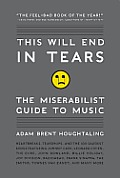
Why does sad music move us so tremendously? This was one of the most intriguing questions I had to answer while working on my book, This Will End In Tears: The Miserabilist Guide to Music. What I found was a confluence of neurological, physiological, and environmental factors that all come together to make our experience with sad music unique and also quite similar to the reading experience.
Notoriously grumpy German philosopher Arthur Schopenhauer once wrote that in our "powers of reflection, memory, and foresight, man possesses, as it were, a machine for condensing and storing up his pleasures and his sorrows." He was more right than he could have imagined.
Interpreting language, whether in a novel or lyrics to a song, engages the same language centers of our brain — Broca's area and Wernicke's area — and neurological evidence now suggests that language descriptive of smell, taste, or touch gives the parts of our brains responsible for those senses a bit of a workout, in effect making us experience them in some small way.
The recognized view of the neurotransmitter dopamine is that it is released when we do something we find pleasurable. So when we engage in highly charged, emotional experiences, the dopamine taps open and it lights up the reward centers in our brain. Sex, drugs, rock and roll, and chocolate cake all give us a hit of organic chemical juice, but so too do the emotional ebbs and flows of a good book. These newer ideas about dopamine suggest that it is released by "seeking" behavior, which can be tied to a thirst for knowledge and explains why you might want to read that history of whaling in America (Leviathan: The History of Whaling in America). We also get a reward when something unpredictable happens, like an unexpected turn in a musical composition or a surprise plot twist in a novel.
But the most important way sad music specifically and the act of reading are connected is through our environmental interactions with both.
Like reading, listening to sad music is most often a solitary activity that creates an intimate bond between writer/performer and reader/listener. You don't often read books out loud to friends or listen to sad music at dinner parties. The connection creates something special between you and the work. In this there is a closeness that heightens our attachment to the experience and makes our love for both novels and sad songs affecting on a deeply personal level.